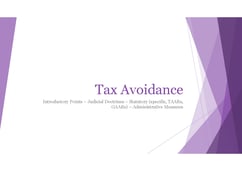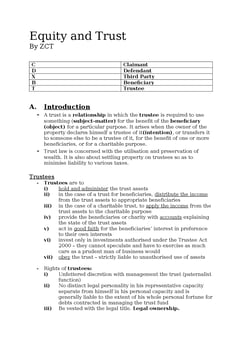Vandervell v IRC [1967] 2 AC 291
Judgement for the case Vandervell v IRC
Table Of Contents
KEY POINTS
The option's benefit was given to a trustee company without payment, needing explicit trust instructions. It explores whether the settlor relinquished interest, impacting dividend treatment as income, guided by the Income Tax Act of 1952, Section 415 (1) and (2).
It involves an equitable assignment where a taxpayer directed a bank, holding legal estate in shares as a bare trustee, to complete a share transfer deed in the college's name. The share transfer deed was executed in blank.
The question is whether a written disposition was required to transfer the beneficial interest. The matter is governed by the Law of Property Act of 1925, specifically Section 53 (1) (c).
In the transfer of an option to buy shares to the company. The question is whether this option is held under a resulting trust in favor of the settler.
FACTS
In 1958, the appellant planned to gift £150,000 to the Royal College of Surgeons for a pharmacology chair. He held 100,000 shares in a private company through a bank as security for payments to his ex-wife.
In November 1958, these shares were released and placed under the appellant's trust. The shares were to be transferred to the college with an option to buy for £5,000, securing the gift amount.
A trustee company managed by the appellant's friends was involved. Dividends of £162,500 and £87,500 from the shares went to the college in 1958-59 and 1959-60.
The trustee company bought the shares in 1961.
The appellant was taxed for surtax on the dividends, as authorities claimed he hadn't fully given up rights to the shares.
The argument was whether there was a valid written transfer of ownership under the Property Act of 1925.
JUDGEMENT
It was held that section 53 (1) (c) of the Law of Property Act, 1925 was inapplicable since it was directed to cases where dealings with the equitable estate were divorced from the legal estate.
The object of the provision was to prevent hidden oral transactions in equitable interests in fraud of those truly entitled.
As per Income Tax Act, 1952, s. 415 and Law of Property Act, 1925, s.53 (1) (c) cases where the beneficial owner of the whole beneficial estate desired and was in a position to give directions to his bare trustee to deal with the legal estate as well as the equitable estate were not within its ambit
COMMENTARY
This appeal is from a legal case triggered by events starting with a February 26, 1965, Court of Appeal order that denied Guy Anthony Vandervell's appeal. Vandervell contested a March 16, 1964, Chancery Division order dismissing his appeal.
The main issue is additional surtax assessments on Vandervell for 1958-59 and 1959-60, totaling £162,500 and £87,500. These assessments are based on dividends from 100,000 "A" ordinary shares in Vandervell Products Ltd. paid to the Royal College of Surgeons. The question was whether these dividends should be attributed to Vandervell's income directly or under sections 404 or 415 of the 1952 Income Tax Act.
ORIGINAL ANALYSIS
Vandervell wanted to make a donation to X. He was the beneficiary of a trust fund of many shares in company 1. To minimise tax he orally instructed the trustees to transfer legal and beneficial ownership to X, but he incorporated company 2 (a trust company with his children as beneficiaries) which would have an option to buy back the shares at a low cost, with the intention that X, a charity, would simply get money from dividends.
HL held that the option was held by company 2 on resulting trust for Vandervell, so that he could still be considered to have an interest in the shares and thus had greater tax liability.
Lord Reid
The theoretical basis for resulting trust comes from the need to fill the beneficial vacuum that would result if the beneficial interest wasn’t held by anybody.
The beneficial interest must belong to or be held for somebody; so if it was not to belong to the donee or be held in trust by him for somebody, it must remain with the donor.
-
This cannot explain those cases where there is no beneficial vacuum.
If, for example, person A advances money to person B in order for person B to purchase land, then a court may hold that B holds that land on resulting trust for A.
But it is not clear that there is any `beneficial vacuum' here.
NB no mention of unjust enrichment as theoretical basis for either resulting or constructive trust
For Further Study on Vandervell v IRC

Taxation Law notes fully updated for recent exams at Oxford and Camb...
Need instant answers? Our AI exam tutor is here to help.
Ask questions 🙋 Get answers 📔 It's simple 👁️👄👁️
Our AI is educated by the highest scoring students across all subjects and schools. Join hundreds of your peers today.
Get StartedSimilar Cases
Related Product Samples
These product samples contain the same concepts we cover in this case.
| Tax Law | Income Tax Notes (12 pages) |
| Trusts and Equity | Trust Remedies Including Tracing Knowing Receipt Trust Dutiies And Powers And Equitable Damages Notes (60 pages) |

